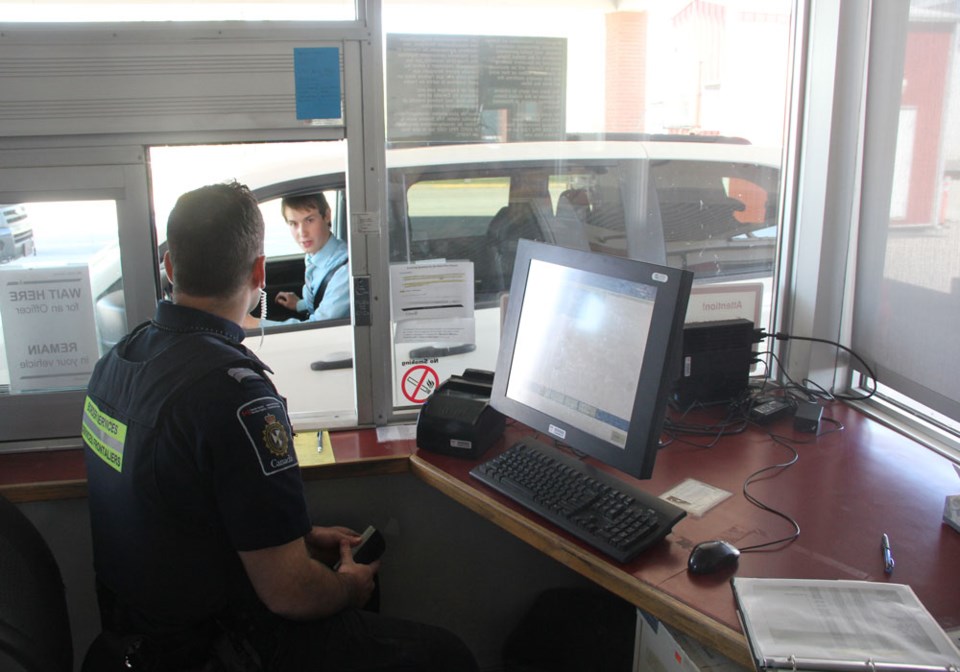For many, travelling across an international border under the scrutiny of the men and women who patrol and protect a country’s boundaries can be a nerve-wracking experience. And that’s how people often feel when they are law-abiding and coming back to a country where they are citizens.
Many who come to Canada or back to Canada have those same misgivings, wondering if something is wrong or if they innocently forgot to declare an item.
As Canada Border Services Agency (CBSA) officer Curtis Barry said, honesty is the most important thing.
Under typical circumstances, “You’ll never get in trouble if you tell the truth,” he said. Though you may have to pay duty or surrender an item that you have willfully declared but isn’t permitted to cross. It’s when something isn’t declared or a person attempts to mislead a CBSA officer that trouble arises.
The CBSA hosted a media open house at the North Portal port of entry last week, providing an inside look at the initial interview process as well as access to inspection bays and the port’s warehouse.
The CBSA team at the North Portal port of entry is tasked with monitoring the busiest international port in the province with high commercial truck traffic and a steady flow of passenger vehicles. It’s not uncommon to see the commercial truck lane lined up in Portal N.D. with dozens of commercial trucks waiting to haul goods into Canada.
“It happens because the volume of traffic is great for that day. Saskatchewan, we’re a booming economy, plus this North Portal entry is a direct gateway to Fort McMurray,” said Barry. “We see a lot of big equipment come through here.”
The port could see some construction in the future if a second commercial traffic lane is opened up.
For travellers, the initial interview with a CBSA officer can be the part of travel that heralds in the most worry.
Barry said each interview is different but there are mandatory questions the public is supposed to be asked when entering the country, like what is the total value of goods that were purchased or acquired? And are you in possession of any firearms or weapons?
“They would ask those questions, and they would base the indicators off that and whether or not a referral is required for further examination or for clarification,” he said.
An important part of determining whether a commuter may be truthful or not is simply whether it’s reasonable to expect their story would lead them to the port they are in at that given moment.
“Lots of the stuff we look for would be routing. Does it make sense that that traveller is at North Portal today? Does it go along the lines with their story? Where are they coming from? There are some states and certain countries that are source countries for certain contraband,” said Barry, and that includes drugs, guns and child pornography, all illegal material the officers at North Portal encounter regularly.
In the inspection bay, the CBSA prepared a table covered with firearms and other weapons that had been seized at the port.
“We see a lot of these things. It’s our job,” said Barry, motioning to the table and adding, “This is what we see quite regularly.”
Seized items are stored at the port until whatever court proceedings they are tied to have been finalized, then they are delivered to the RCMP and destroyed.
Barry said the items displayed showed a snapshot of a “banner” year for the port. At Saskatchewan land ports, 33 firearms were seized in 2014, 27 of which were seized at North Portal.
Barry said for those who want a detailed look at what life can be like for CBSA officers across the country, the National Geographic show Border Security may be a very realistic depiction.
“It would be very accurate, the stuff you would see on there,” said Barry, though he doesn’t watch the show himself. “It, honestly, just reminds me of work.”
Secondary referrals come about for a number of reasons, and previous enforcement is a common one. If a traveler has previously been flagged for a problem, like failing to properly declare all goods they are travelling with during the initial interview, they are very likely to have their vehicle searched each time they cross the border.
At other times, questions are asked because of events unfolding around the world, from the Ebola outbreak to, more recently, the avian flu outbreak in the United States. Because of that, right now, it’s food, plant or animal questions that are important ones for officers. Currently, no uncooked chicken is allowed to enter from the U.S.
Of course, a traveller doesn’t need to set off any alarm bells or trigger any warning signs in an officer. Vehicles are randomly selected for further searches. And while that may not ease the minds of those nervous individuals crossing the border, it’s all a necessary part of the process.
“We want (the travellers) to get away from the feeling like when they get referred for an examination that they’re being stereotyped or discriminated against. It’s really not the case at all. Referrals are, at times, completely random, and they’re part of our job,” said Barry.




